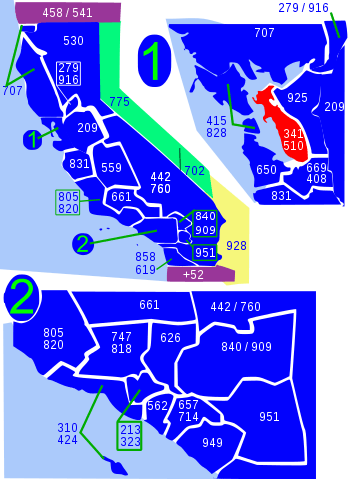Area codes 510 and 341
Area codes 510 and 341 are telephone area code in the North American Numbering Plan (NANP) serving much of the East Bay in California. They cover parts of Contra Costa County and western Alameda County, including the city of Oakland, but excluding Dublin, Livermore, Pleasanton, and Sunol.

Area code 510 was established on September 2, 1991 in a split from area code 415.[1] On March 4, 1998, the inland portion of the East Bay was split off as area code 925. The dividing line followed the Berkeley Hills; almost everything west of the hills stayed in 510, while everything east of the hills transferred to 925.
In response to projections that 510 would exhaust in the second quarter of 2019, the California Public Utilities Commission approved the addition of an overlay area code, 341, to serve the East Bay. The first central office codes in 341 became available on July 22, 2019.[2][3] Ten-digit dialing became mandatory in the East Bay a month earlier, on June 22; attempts to make seven-digit calls triggered an intercept message reminding callers of the new procedure.[4] Prior to 2019, 510 had been one of the few urbanized area codes without an overlay, making Oakland one of the few large cities where seven-digit dialing was still possible.
Cities in the numbering plan area
Alameda County
Contra Costa County
Introduction of 341
By 2016, the California Public Utilities Commission (CUPC) projected that NPA 510 would exhaust its numbering pool by the second quarter of 2019. In response, the commission held meetings in Berkeley, Oakland and Hayward in January and February 2017 to discuss area code relief for 510.[2] The North American Numbering Plan Administrator (NANPA) proposed in May 2017 that CPUC relieve 510 by introducing the overlay area code 341 for the entire territory. NANPA had previously assigned 341 as the relief area code for 510 in 1999, but nationwide number pooling procedures eliminated the need at that time. The NANPA retained 341 for the then-future relief of 510.[5] CPUC accepted the NANPA proposal in a decision on June 21, 2018.[3] With the start of the overlay plan in July 2019, all customers in the numbering plan area can be assigned telephone numbers with either code, and must dial the area code for all calls; otherwise, a recorded message will remind them if they dial incorrectly.[6][7]
Prior usage of 510 for TWX
In the United States, AT&T originally used NPA 510 for the TWX (TeletypeWriter eXchange) network. Western Union acquired the TWX network in 1969 and renamed it Telex II. By the 1970s, three TWX codes had been added (710 in the Northeast, 810 in Michigan, Ohio, Indiana, Kentucky, North Carolina, South Carolina, Georgia, Florida, Louisiana, Mississippi, and Alabama; and 910 west of the Mississippi). Each major city had one or more local exchange prefixes.[8] Western Union upgraded the network to "4-row" ASCII operation (it previously used both "3-row" Baudot and ASCII transmission) and decommissioned the special TWX area codes in 1981.
In Canada, TWX used 610 (nationwide) from 1962 until the remaining numbers were moved to area code 600 in 1992.
See also
References
- "Archived copy" (PDF). Archived from the original (PDF) on 2011-06-04. Retrieved 2008-09-01.CS1 maint: archived copy as title (link)
- Prosper, Terrie (June 21, 2018). "CPUC Provides More Numbers in 510 Area Code Region" (PDF) (Press release). California Public Utilities Commission. Retrieved June 21, 2018.
- California Public Utilities Commission (June 21, 2018). "Decision Granting Request for an All-Service Area Code Overlay in the 510 Numbering Plan Area" (PDF). Retrieved June 21, 2018.
- "341 Area Code, New Dialing Procedure Coming To Alameda, Contra Costa Counties". KPIX-TV. June 21, 2019.
- North American Numbering Plan Administrator (May 19, 2017). "Application of the North American Numbering Plan Administrator, On Behalf of the California Telecommunications Industry, For Relief of the 510 Numbering Plan Area" (PDF). Retrieved June 21, 2018.
- Avalos, George (June 21, 2018). "341 is the East Bay's new telephone area code, joining 510, 925". The Mercury News. Retrieved June 21, 2018.
- NANPA planning letter PL-518 for area code 341 overlay
- Traffic Routing Guide, sec. 15-16, AT&T, 1975
External links
| California area codes: 209, 213/323, 279/916, 310/424, 341/510, 408/669, 415/628, 442/760, 530, 559, 562, 619/858, 626, 650, 657/714, 661, 707, 747/818, 805/820, 831, 840/909, 925, 949, 951 | ||
|---|---|---|
| North: 707 | ||
| West: 415/628, 650 | area code 510/341 | East: 925 |
| South: 408/669 | ||